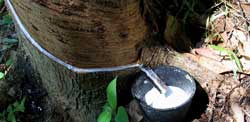Return to lockdowns muddle shipments, rubber demand according to the latest report by the ANRPC (The Association of Natural Rubber Producing Countries) published June 1-15, natural rubber (NR) prices in key futures and physical markets declined during the first half of June 2021 as a result of a resurgence of Covid-19 cases.
Following the detection of more than 100 cases of a potentially more contagious ‘Delta’ variant of Covid-19 infection in Guangzhou City in Guangdong, parts of China have returned to lockdowns, quarantines, and containment measures after about a year. Guangdong is China’s manufacturing hub and biggest province by economic output. Covid-19 related disruption of logistics operations, specifically; the new outbreak in Guangzhou has worsened the already constrained shipping logistics and port operations and thus impacted on the country’s trade sector.
The new wave of COVID-19 infections in the ASEAN has affected China’s external demand because ASEAN is China’s biggest trade partner. Likewise, China’s manufacturing has been affected by soft domestic demand, abnormal rise in raw material cost, continuing global chip shortage, and supply chain disruptions. Chinese industrial production slowed down to 8.8%, year-over-year, in May 2021 compared to a 9.8% growth posted in April, according to the data release on June 16 by the National Bureau of Statistics. Hindered by the continued global chip shortage and other constraints, the output of auto vehicles in the country fell 4%, year-over-year, in May 2021 against a 6.8% year-over-year rise posted in April 2021.
Meanwhile, the global logistics challenges in various forms such as prolonged container shortage, lack of ship space to move the containers, significant delays at ports, increase in ocean freight and rail cost, and acute shortage of commercial drivers, have constrained the US auto-tyre sector, impacting demand in this segment, considering that the country has started lifting pandemic-related restrictions . Its economic rebound has also generated demand for auto-tyres.
Manufacturing companies are reportedly struggling to get the products shipped and received in a timely manner. The increases in freight and raw material costs, delays at ports, and high inflation are affecting the profit margin in the manufacturing sector as a whole and the auto-tyre manufacturing industry is no exception.
India’s auto sector strained by health crisis
India’s GDP contracted 7.3% during the fiscal year ended March 2021, according to the estimates released by the government on 7 June. The alarming rise in the number of newly infected Covid-19 cases has forced several state governments in the country to reintroduce lockdowns since May 2021. Although the daily new cases are on a decline since the second week of June 2021, the country still has nearly 1 million active cases as of mid-June.
That said, the resurgence of Covid-19 has badly impacted the country’s auto sector, which, at the beginning of 2021, had already shown strong signs of recovery. The four-wheeler sales in India fell 59% in May 2021, from 208,900 units in April 2021 to 85,700 units. The two-wheeler sales also fell 52.5% in May 2021 compared to April 2021. These developments have badly impacted both on the demand for auto-tyres from the OE sector as well as the replacement sector, ANRPC reported.
Rubber glove sector needs a secure latex supply
Rubber glove manufacturing companies are reportedly struggling to cater the huge demand for gloves created by the pandemic. The manufacturing companies are under pressure to maximise the output by running their plants uninterrupted. A secure supply of latex is prerequisite for the same. It is a real challenge to ensure the supply of latex during the wintering off-season. But manufacturing companies manage this by offering premium prices to latex so that farmers will be prompted to continue harvesting even during the off-season and sell the produce in the form of latex rather than cup-lump. The premium prices are no longer offered as the wintering off-season has now ended.
Low NR demand as ASEAN squares with Covid-19, low vaccine deployment
The resurgence of the COVID19 infections has adversely impacted the consumption of NR in the ASEAN region. The manufacturing activities in Malaysia, Thailand, Viet Nam, and Indonesia are disrupted due to the lockdowns, mobility restrictions, workforce minimisation, and the various control measures imposed by the respective governments. Manufacturing factories have been identified as major sources of infections in Malaysia, Thailand, and Viet Nam. Malaysia has further extended the enforcement of the countrywide “Movement Control Order” to 28 June.
In Thailand, the virus infections have reportedly led to temporary closure of around 130 factories, including rubber glove and other rubber products manufacturing factories, as of mid-June. Viet Nam has reportedly closed several industrial parks, until further notice, due to an outbreak of Covid-19.
The slow vaccination deployment remains as a serious hurdle in the ASEAN region to bring the economies back to life. Fully vaccinated population constitutes only less than 5% of the total population in Indonesia, Malaysia, Thailand and VietNam as of mid-June.
Major NR consuming countries in the ASEAN are also constrained by the slow rate of the vaccination deployment. As India and the major NR consuming countries in the ASEAN are expected to take longer to attain herd immunity and reopen economic activities, the demand for NR from these countries is likely to remain weak in the short-term, ANRPC concludes.

